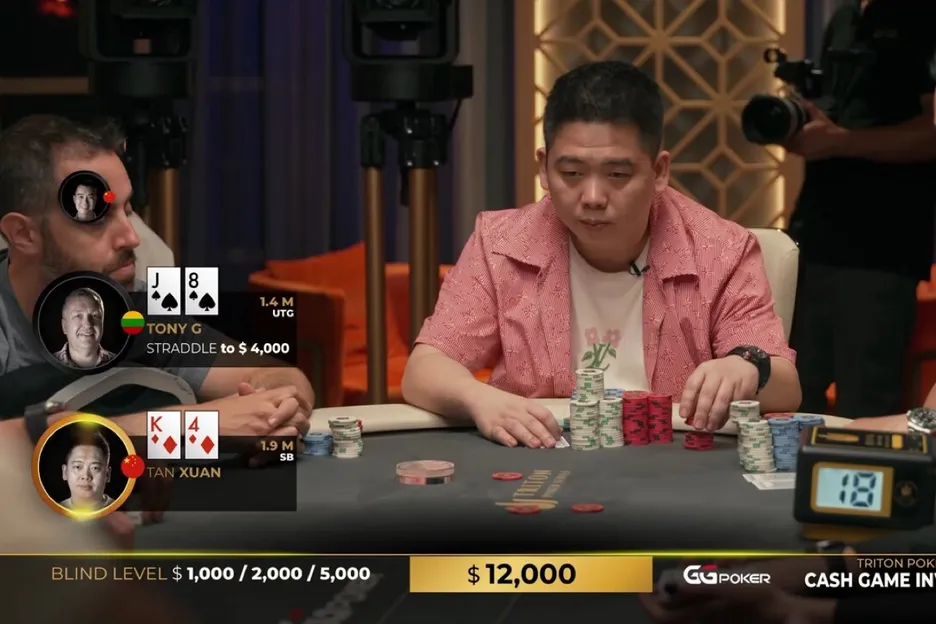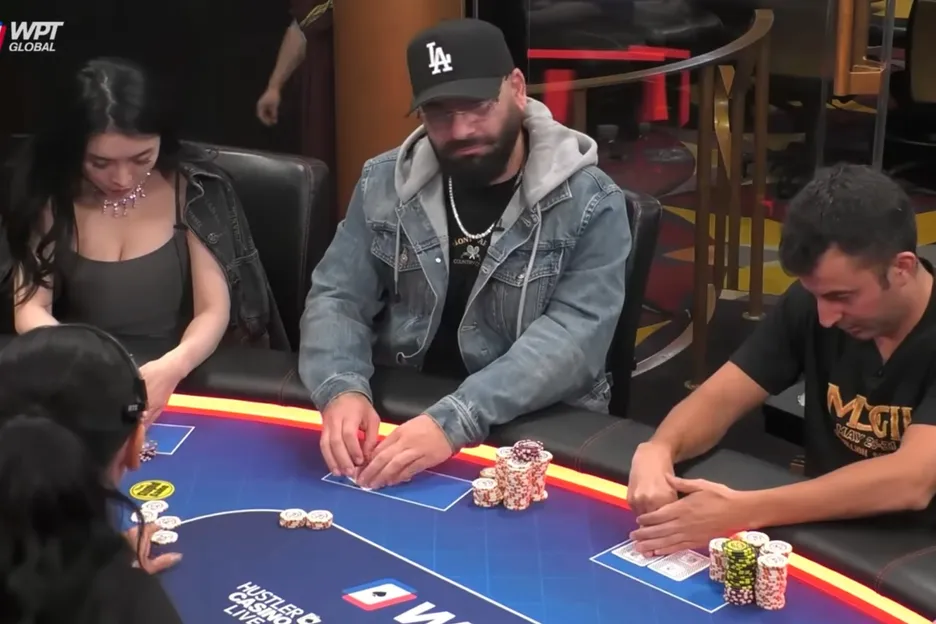Soapbox is a new regular series of passionate rants from poker players around the world. Have you got something you want to get off your chest? Just email us at hello@poker.org with a brief outline and you can get your very own Soapbox to rant from. You can get involved in the debate by adding your comments underneath the article.
Straddling is the single most ridiculous waste of money in poker and makes zero sense.
That’s a very powerful opening statement, but I hope that this article will convince most right-minded players to never put another penny into the pot that they don’t have to without seeing their cards first. In fact, that sentence alone should be enough in itself to inject some rational thought into your decision-making process.
In your ideal (fantasy) cash game, if you were given the choice of where to sit – in a game, I might add, where the button never moves – where would you choose? I hope all of you will choose to sit on the button, as this is undoubtedly the seat that gives you an edge over the rest of the table. At the risk of stating the obvious, you will always have the final say in each round of betting after the flop and will therefore be able to see what each player does before you have to decide what to do.
With the above in mind, where would the worst place to sit be? I think everyone will agree that under the gun is the worst position on the table. The blinds have been posted, and preflop, you have to decide what to do with up to eight other players to act after you. Raising with marginal hands can be risky, and limping with marginal hands is also risky. Think about it: You have eight other players behind you. If you have a marginal hand that you would quite often play in late position, then under the gun is quite a precarious position to play it from. Bearing all of this in mind, there are five types of hand you can be dealt.
- A weak hand, such as 7-2, 8-3, T-5 or J-4
- A speculative hand, weak but with slightly more potential, such as 3-4s, 8-9s, 10-J offsuit
- A marginal hand, such as, Q-Ts, K-J, K-Q or A-T
- A strong hand like A-Q, J-J, A-Js
- And finally, a monster hand, such as A-A, K-K, A-K, Q-Q
Now, there are nine non-picture cards and only four picture cards. It’s simple maths to work out that you are going to be dealt unplayable hands most of the time. Statistically, the majority of the time, you are going to be dealt weak/speculative hands. Now what that means for all you straddlers out there is that 80% of the time you straddle, you will wake up with a hand that you were unlikely to have even considered limping with.
Putting in the most money in the worst position
Now considering the above, when you find yourself under the gun, what clouds your addled mind enough to make you think that it’s a good idea to compound this issue by putting extra money into the pot without seeing what pile of crap you’ve been dealt first? You’re deciding to put double the big blind in on a whim, you will be out of position to the whole table for the rest of the hand and, in most cases, with an unplayable hand. This is a horrible situation for any poker player. Why on God’s green earth did you voluntarily put yourself and, more importantly, your hard-earned money into this position?
Most poker players, deep down, know that straddling is a pure gamble, and, in its defence, gambling should be a calculated part of every poker player’s strategy. But when you decide to gamble, you should be getting the correct odds to make it a long-term successful strategy. And you are never getting the correct odds when you put your money in blind.
If you are not getting the correct odds, you may sometimes win, but math will eventually catch up with you, and you will lose more money than you will win. In short, you should only be gambling with cards that you have chosen to gamble with.
The arguments for straddling
If you ask a player why they straddle, they will say one of two things:
- Because I might wake up with a monster
- Because it creates action
These are the only two arguments that a regular straddler has in their arsenal to defend their actions.
With regards to the first statement, yes, you might wake up with a monster hand, but this will be so infrequent that it can’t possibly make up for the number of times that you wake up with garbage. And waking up with a monster doesn’t mean you are going to win the hand anyway. Also, if you do find a great hand when you straddle, you will have had the same hand under the gun, often making little difference to the amount of money you win or lose.
And with regards to the second statement: “Straddling creates action!” Well so does betting! As I mentioned above, even if you don’t straddle you will still be dealt aces and you can then make a bet, creating action yourself, and you can do that from the same position as the straddle. But when you do, it will be with a hand that you’ve chosen rather than 7-2 offsuit, which is one of the more likely hands you will be dealt.
I recently had a discussion with another player with regards to straddling and he suggested that if he straddled, it could conceivably end up being a limped pot and he would then be in a position whereby he is playing a hand such as T-6 offsuit, with which he could win a monster pot, that he would never have normally won because he would never have played it from that position. This large win, he suggested, would make up for all the other times he’s straddled and lost. With respect to that player, what a load of nonsense!
If you say that you will occasionally win with any conceivable hand when you straddle, such as T-6, and, as an example, run several scenarios where you win big pots, then why don’t you play T-6 all the time? If you truly think you can make playing T-6 profitable, then add it to your limping/raising/calling range and never fold it. See where that gets you.
The rich person’s limp
In fact, what you are doing when you straddle is adding every conceivable hand to your limping range, because straddling is a rich person’s limp. You are adding a huge range of hands to what you are limping into pots with, because when you decide to straddle and there is a raise and several callers, you are almost always getting supposed value when you decide to defend it.
Just to give you an idea of the kind of money a professional $1/2 poker player adds to pots by straddling every year, the following is a very rough calculation:
If you are playing cash poker to make a living and you have regular eight-hour sessions, five days a week, for 45 weeks a year, that’s 1,800 hours of cash poker per year (and some people do a lot more than that, by the way). In an average live game, you are dealt, conservatively, between 20-30 hands per hour, so let’s take the middle ground and say 25 hands per hour.
If you straddle at every opportunity, which will be about three times per hour at $4 per straddle, then you will be adding $12 per hour to the pot that you don’t have to. Now don’t forget you are playing 1,800 hours per year, so multiply that by $12 and it comes to $21,600 every year. That’s a hell of a lot of money for your average $1/2 player.
What this now means is that you have to win more than $21,600 in your straddle per year to make this a successful strategy. Ask yourself honestly: do you really think you are doing that? I don’t think so. I think a successful $1/2 player is fluctuating between a loss in a bad year to winning $40,000 in a good year. If you are in the top end of earners and are a regular straddler, earning 40K a year, do you really think that having to earn over 20K just in your straddle is where your profit is coming from?
No, that’s actually a leak in your game and you could significantly increase your earnings just by not straddling. If you are trying to make a calculation proving that you are winning money on your straddles, you should also factor in the fact that the vast majority of hands you win from straddling would win anyway.
One last argument a lot of players try to use is that it makes sense to straddle if everyone is straddling, because it all balances out. Once again, this statement makes no sense at all. In a $1/2 game, if everyone is straddling for $4, then you are not playing a $1/2 game; you are playing a $1/2/4 game, and, in effect, no one is actually straddling; you are just playing a bigger game.
I hope this puts the issue to bed!



